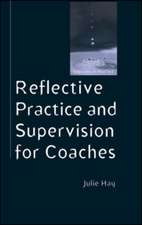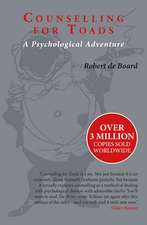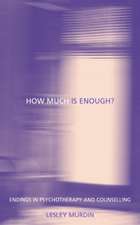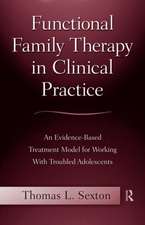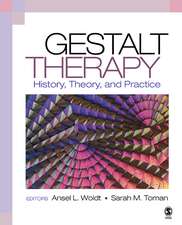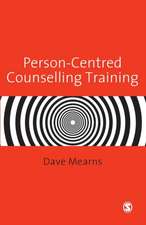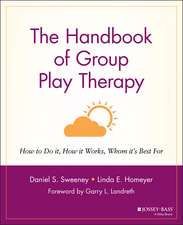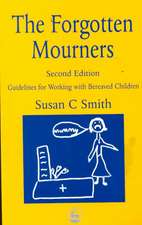Using Neuroscience in Trauma Therapy: Creative and Compassionate Counseling
Autor Julie A. Uherniken Limba Engleză Hardback – 20 iul 2016
| Toate formatele și edițiile | Preț | Express |
|---|---|---|
| Paperback (1) | 362.63 lei 43-57 zile | |
| Taylor & Francis – 21 iul 2016 | 362.63 lei 43-57 zile | |
| Hardback (1) | 1282.28 lei 43-57 zile | |
| Taylor & Francis – 20 iul 2016 | 1282.28 lei 43-57 zile |
Preț: 1282.28 lei
Preț vechi: 1349.76 lei
-5% Nou
Puncte Express: 1923
Preț estimativ în valută:
245.37€ • 256.83$ • 204.22£
245.37€ • 256.83$ • 204.22£
Carte tipărită la comandă
Livrare economică 31 martie-14 aprilie
Preluare comenzi: 021 569.72.76
Specificații
ISBN-13: 9781138888111
ISBN-10: 1138888117
Pagini: 188
Ilustrații: 12
Dimensiuni: 152 x 229 mm
Greutate: 0.39 kg
Ediția:1
Editura: Taylor & Francis
Colecția Routledge
Locul publicării:Oxford, United Kingdom
ISBN-10: 1138888117
Pagini: 188
Ilustrații: 12
Dimensiuni: 152 x 229 mm
Greutate: 0.39 kg
Ediția:1
Editura: Taylor & Francis
Colecția Routledge
Locul publicării:Oxford, United Kingdom
Public țintă
Professional and Professional Practice & DevelopmentCuprins
List of Figures Preface Acknowledgements 1.A New Look at the Amazing Brain 2. Basic Brain Functioning 3.Connections 4.The Communicators 5.Trauma and the Brain 6.The Therapist Imperative 7. What Does It Mean to Heal? 8. Pacing Counseling with the Intent to Heal 9. The Whole of Experience: Integrative and Creative Approaches for Trauma Treatment 10. Trauma, the Brain, and the Future
Notă biografică
Julie A. Uhernik, RN, LPC, NCC, is a clinician in private practice in Colorado. In addition to counseling work with couples, individuals, and families, she specializes in disaster mental health and trauma. She has worked in emergency planning and public health and serves on several national disaster mental health response teams.
Recenzii
"This is the best professional guide for practical integrative mental health treatment I've read to date. Using Neuroscience in Trauma Therapy should be considered essential reading for any clinician who sees clients struggling with trauma. By the time you finish this refreshingly concise, easy-to-follow text, you will know about the wide array of integrative (Eastern and Western) treatments for trauma and their basis in the brain."
Valerie L. Varan, MS, LPC, NCC, author of Living in a Quantum Reality: Using Quantum Physics and Psychology to Embrace Your Higher Consciousness
"Using Neuroscience in Trauma Therapy is a special book that brings much-needed clarity and structure to understanding trauma and the brain. Uhernik seamlessly weaves together a fascinating blend of history, neuroscience research, powerful case studies, body-centered techniques, and trauma-informed approaches. Beyond being a compelling, compassionate, and straightforward primer on healing trauma, Using Neuroscience in Trauma Therapy is filled with real world, practical, and adaptable tools that therapists will put to use."
Donald Altman, MA, LPC, bestselling author of The Mindfulness Toolbox and Clearing Emotional Clutter
"Using Neuroscience in Trauma Therapy should be in every psychotherapist’s library. Julie Uhernik has a wonderful way of condensing complicated neuroscientific principles into understandable concepts that then can be grounded into excellent psychotherapy practice for people suffering from PTSD and traumatic stress. As a trauma therapist I would also encourage clients to read it as a refreshingly destigmatizing approach to understanding psychological trauma. Highly recommended!"
Susan Pease Banitt, LCSW, RYT, psychotherapist and author of The Trauma Tool Kit: Healing PTSD From the Inside Out and executive director of Lotus Heart Counseling
"There is no shortage of stress in the world today, and much of it comes from a traumatic experience earlier in life. Julie Uhernik’s book provides a most valuable resource, one that helps unlock the barriers of trauma and lead one toward a sense of inner peace. Simply stated: understanding the neuroscience of trauma is essential in helping our clients resolve stress."
Brian Luke Seaward, PhD, author of Managing Stress, 8th edition, and Stand Like Mountain, Flow Like Water
"This book is a gem for mental health professionals! You need to know about brain science as it pertains to trauma, healing trauma, and resilience. Julie Uhernik did your homework for you and wrote an accessible, useful book that will positively impact your treatment of trauma. You will see your clients in this book, so read, highlight, and keep this book nearby."Mary Nurrie Stearns, LCSW, RYT, counselor in private practice, speaker, and coauthor of Yoga Mind, Peaceful Mind; Yoga for Emotional Trauma; and Yoga for Anxiety
“Uhernik’s writing is clear, direct, and focused on helping the reader fully understand the material. Its exclusive focus on neurological factors helps limit the scope of the book, and that makes it particularly readable. There are not side discussions of related issues or discussions of biological topics that would not be related directly to neurology.” Daniel Martson, PhD, Clinical Psychologist, Private Practice
Valerie L. Varan, MS, LPC, NCC, author of Living in a Quantum Reality: Using Quantum Physics and Psychology to Embrace Your Higher Consciousness
"Using Neuroscience in Trauma Therapy is a special book that brings much-needed clarity and structure to understanding trauma and the brain. Uhernik seamlessly weaves together a fascinating blend of history, neuroscience research, powerful case studies, body-centered techniques, and trauma-informed approaches. Beyond being a compelling, compassionate, and straightforward primer on healing trauma, Using Neuroscience in Trauma Therapy is filled with real world, practical, and adaptable tools that therapists will put to use."
Donald Altman, MA, LPC, bestselling author of The Mindfulness Toolbox and Clearing Emotional Clutter
"Using Neuroscience in Trauma Therapy should be in every psychotherapist’s library. Julie Uhernik has a wonderful way of condensing complicated neuroscientific principles into understandable concepts that then can be grounded into excellent psychotherapy practice for people suffering from PTSD and traumatic stress. As a trauma therapist I would also encourage clients to read it as a refreshingly destigmatizing approach to understanding psychological trauma. Highly recommended!"
Susan Pease Banitt, LCSW, RYT, psychotherapist and author of The Trauma Tool Kit: Healing PTSD From the Inside Out and executive director of Lotus Heart Counseling
"There is no shortage of stress in the world today, and much of it comes from a traumatic experience earlier in life. Julie Uhernik’s book provides a most valuable resource, one that helps unlock the barriers of trauma and lead one toward a sense of inner peace. Simply stated: understanding the neuroscience of trauma is essential in helping our clients resolve stress."
Brian Luke Seaward, PhD, author of Managing Stress, 8th edition, and Stand Like Mountain, Flow Like Water
"This book is a gem for mental health professionals! You need to know about brain science as it pertains to trauma, healing trauma, and resilience. Julie Uhernik did your homework for you and wrote an accessible, useful book that will positively impact your treatment of trauma. You will see your clients in this book, so read, highlight, and keep this book nearby."Mary Nurrie Stearns, LCSW, RYT, counselor in private practice, speaker, and coauthor of Yoga Mind, Peaceful Mind; Yoga for Emotional Trauma; and Yoga for Anxiety
“Uhernik’s writing is clear, direct, and focused on helping the reader fully understand the material. Its exclusive focus on neurological factors helps limit the scope of the book, and that makes it particularly readable. There are not side discussions of related issues or discussions of biological topics that would not be related directly to neurology.” Daniel Martson, PhD, Clinical Psychologist, Private Practice
Descriere
Using Neuroscience in Trauma Therapy provides a basic overview of structure and function of the brain and nervous system, with special emphasis on changes that occur when the brain is exposed to trauma.


